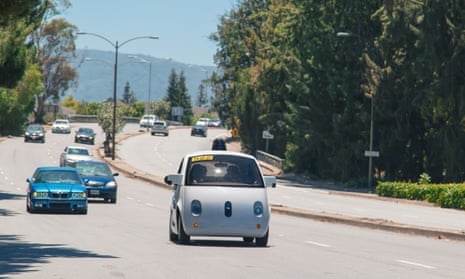A self-driving Audi owned by Delphi Automotive took “appropriate action” to avoid one of Google’s self-driving Lexus cars after it cut it off on a Californian road in a rare meeting of driverless vehicles.
John Absmeier, who was travelling in his company’s car at the time, said the Delphi Audi was forced to abort its lane change in the incident, which happened earlier this week.
The incident was initially reported as a “close call” by Reuters, which cited Absmeier’s comments, but both self-driving car companies involved have since been at pains to state the incident was being used as an example of the cars operating safely.
A Delphi spokeswoman, Kristin Kinley, told Ars Technica: “The story was taken completely out of context when describing a type of complex driving scenario that can occur in the real world. Our expert provided an example of a lane change scenario that our car recently experienced which, coincidentally, was with one of the Google cars also on the road at that time.”
Delphi later released another statement saying: “It was an anecdote of an interaction, not a ‘near miss’. Reuters completely misrepresented the facts.”
A source at Google also confirmed there was no near collision and said no one was at fault.
Reuters says “the description differed from Delphi’s original account on Thursday”, and a Reuters spokesman said the company “stands by accuracy of its original story.”
Self-driving car companies are particularly sensitive over their safety records. A report from Google in May revealed that its own fleet of cars has had 11 minor accidents since the programme began in 2009. The director of the programme, Chris Urmson, wrote that not one self-driving car was the “cause” of an accident, and many of the incidents involved the car being rear-ended by another vehicle.
Delphi, a self-driving startup, also reported an accident with one of its cars back in October, when an accident report showed that it was broadsided by another car while waiting to make a left turn – although the Delphi car was not actually in self-driving mode at the time, it was still required to report the accident under Californian law.
As of May, there were seven companies with testing permits in the state, operating 48 self-driving vehicles. None of the other five had reported any accidents.
On Thursday, Google announced that its purpose-built self-driving cars, nicknamed the “koala cars” due to their marsupial-like appearance, are also taking to public roads.
In a blogpost, the company detailed the features of the cars, saying: “They’re ultimately designed to work without a steering wheel or pedals, but during this phase of our project we’ll have safety drivers aboard with a removable steering wheel, accelerator pedal, and brake pedal that allow them to take over driving if needed. The prototypes’ speed is capped at a neighborhood-friendly 25mph, and they’ll drive using the same software that our existing Lexus vehicles use.”

Comments (…)
Sign in or create your Guardian account to join the discussion